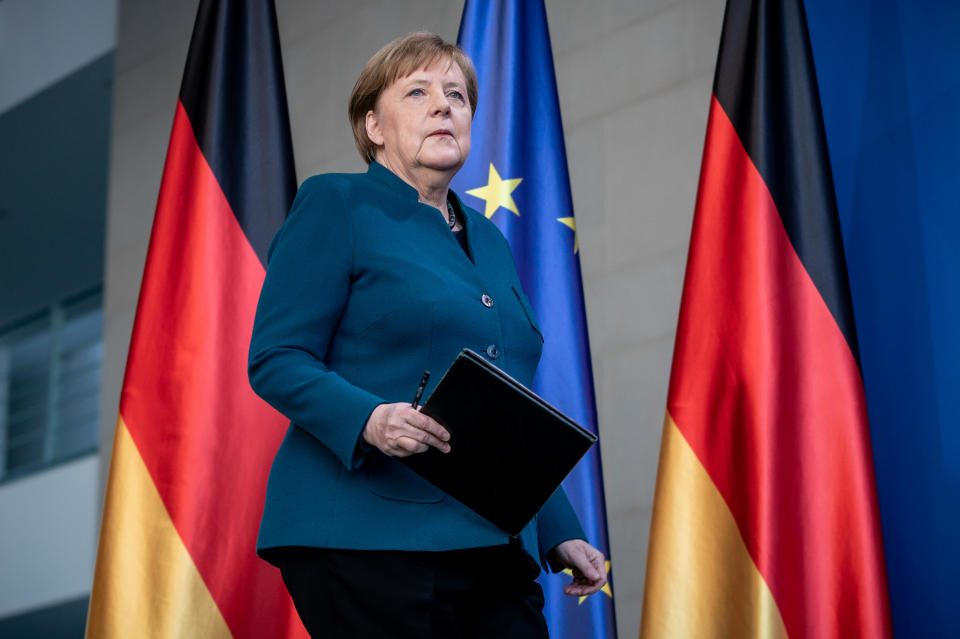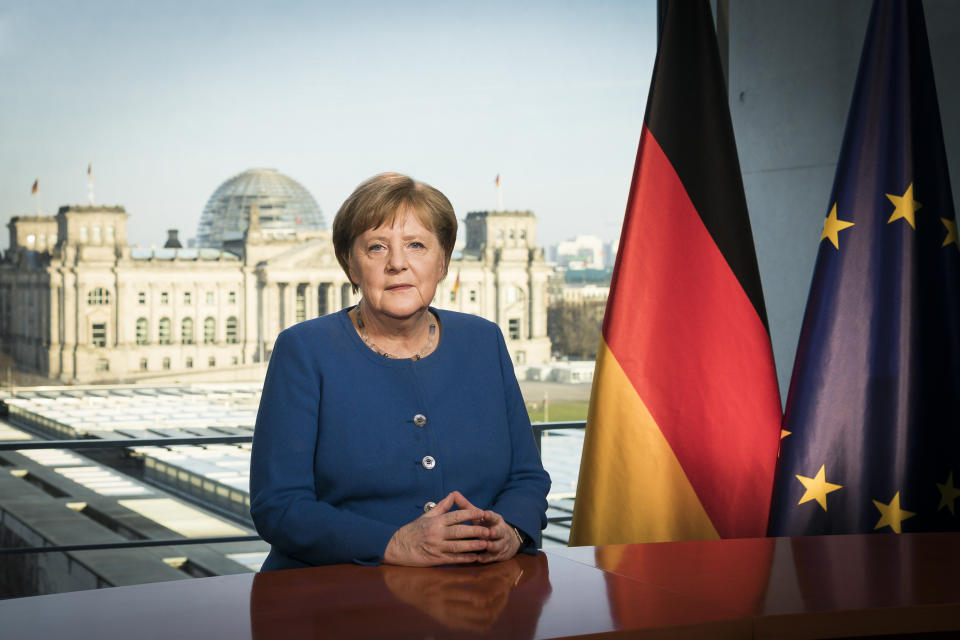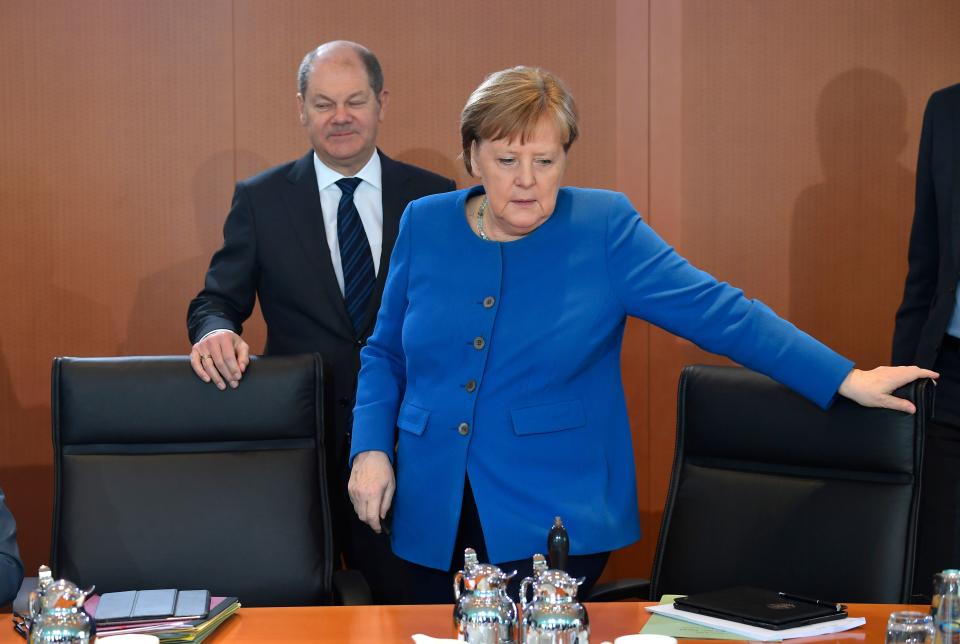Angela Merkel’s final act is her biggest challenge so far

The true test of a leader is when they have to navigate a crisis. And German chancellor Angela Merkel could have been forgiven for thinking that after steering Europe’s largest economy through the credit crunch, the eurozone debt problems, and the refugee crisis, there could be no more big tests to come during her fourth and final term.
Despite the fact that her Christian Democratic Party (CDU) has been mired in an ongoing identity crisis and was recently rocked by the resignation of the woman the chancellor had backed to replace her as party leader, Merkel herself appeared to be in cruise-control.
Then came the coronavirus pandemic.
Now the 65-year-old chancellor has been handed the biggest crisis of her tenure and a mandate to save the lives of German citizens, protect Europe’s largest economy, and help guide the European Union through the most devastating crisis the world has seen in decades.
From ‘Mädchen’ to ‘Mutti’
Merkel has come a long way from when reunification chancellor Helmut Kohl referred to her as “mein Mädchen” (meaning ‘my girl’ in English), when she made her debut in Kohl’s government as federal minister for women and youth in 1991.
After 15 years at the helm, she still often tops opinion polls as the country’s most popular politician, widely referred to as “Mutti” (meaning ‘mum’ in English) due to her being seen as a kind of mother of the nation.
However, over recent weeks her approval ratings have shot through the roof — even as she ran the country from her apartment in central Berlin whilst confined to a two-week quarantine after having contact with a doctor who tested positive.
An Infratest Dimap survey (link in German) for broadcaster ARD on Thursday 2 April showed support for Merkel’s government has soared in the last two weeks, with 72% of voters saying they are satisfied with the government's handling of the crisis.
When it became clear that coronavirus had escalated into a dangerous pandemic, Merkel, herself a trained scientist, consulted the experts, and deemed the situation serious enough to make the first national television address of her tenure outside her annual New Year’s message.
She underscored what was at stake and urged Germans to start acting for the common good by staying at home to try flatten the rising curve in infections.
“This is serious. Take it seriously,” she told the nation. “Since German unification — no, since World War II — there has been no challenge to our country in which our acting together in solidarity matters so much.”
READ MORE: Germany bids goodbye to ‘black zero’ with €750bn coronavirus package
Then Merkel, together with her vice-chancellor and finance minister Olaf Scholz, made the unprecedented move of lifting the constitutional “debt brake” that legally forbids Germany from taking on fresh debt to unleash a €750bn (£660bn, $810bn) fiscal stimulus package to save jobs and protect the economy.
Germany’s test-early, test-a-lot response, coupled with decisive action on social and economic lockdowns has proven wise. The country’s fatality rate from COVID-19 is starkly lower than for example Spain and Italy.
As of Monday 6 March, Germany had 100,168 confirmed cases of coronavirus, and 1,590 deaths, according to Johns Hopkins University data.
Crisis chancellor

Merkel has weathered many crises since she became chancellor in 2005, including most recently the refugee crisis, where she opened Germany’s borders to around one million refugees, many fleeing the civil war in Syria.
Her response to the refugee crisis, encapsulated in her phrase “we’ll manage it” (“wir schaffen das”), did not go far enough to reassure Germans that the country could indeed handle it, and hurt the CDU badly in the 2017 general election. Voters deserted the centre-right party in droves and delivered a huge boost to the far-right Alternative For Germany (AFD), which entered the national parliament for the first time as the biggest opposition party.
Stefan Schneider, chief German economist and managing director at Deutsche Bank Research in Frankfurt, told Yahoo Finance UK that Merkel’s approach to the coronavirus crisis is cautious “in terms of saying we shouldn’t risk anything in prematurely easing up the lockdown because of the risk of a second wave, which then makes the whole thing more costly, is obviously evident and as a politician she is playing it safe.”
“What else should she do? She doesn’t want to be blamed at the end of her last term for being reckless with the health of the German public,” Schneider added.
Sharing the European load

Germany has come under pressure in recent weeks from leaders of other European states to agree to borrow as one and pool their debt, something Berlin has long been opposed to. Some commentators have noted that how Merkel responds to the call to allow for a mutual borrowing — likely in the form of so-called corona bonds—could shape the future unity of the EU as well her own legacy as Europe’s most powerful leader.
Writing in the Guardian on Sunday, Spanish prime minister Pedro Sanchez said: “either we respond with unwavering solidarity or our union fails.”
He welcomed the ECB’s emergency purchase programme and the EU Commission’s €100bn short-time work programme, but went on to say that the new measures and the current European Stability Mechanism were not enough.
“It is time to act with solidarity in creating a new debt mutualisation mechanism, acting as a single bloc for the purchase of essential medical supplies, establishing coordinated cybersecurity strategies, and preparing a major emergency plan to ensure that the continent’s recovery is rapid and robust,” he wrote.
Italian prime minister Giuseppe Conte, and the heads of eight other eurozone countries, including France, also called for the European Union to back assuming joint debt in the form of corona bonds.
Merkel is staunchly against shouldering common debt-responsibility, saying recently that “with the ESM we have a crisis instrument that provides many opportunities that do not call into question the basic principles of our joint but responsible action.”
Schneider from Deutsche Bank Research says that Germany is already showing solidarity and a willingness to pay its fair share by backing von der Leyen’s measures. He believes that to a large extent some countries are using this extreme situation “as a lever to get the European fiscal mutualisation onto another level.”
“In this respect, and I think it’s a little bit unfortunate, the debate about European solidarity is basically an arm-twisting exercise on whether we get fiscal mutualisation in Europe,” Schneider notes.
The EU split on taking on this issue has dogged the bloc since the financial crisis. Germany was firmly opposed back then, and in the end the solution was the European Stability Mechanism to lend to countries in need.
In Schneider’s view, headlines about Merkel’s legacy being dependent on her response to the joint-debt question “are just another way of putting pressure on Germany — and then you read through and they are suggesting that Merkel open German taxpayers’ wallets. If that’s basically the demonstration of leadership to spend your people’s money, I’m not convinced,” he says.
Carsten Brzeski, ING Germany’s chief economist told Yahoo Finance UK that “a corona bond might have had the charm of being extremely symbolic, but as an economist I think it wouldn’t make a difference because we are in a situation right now where the fiscal rules have been waived, the ECB is buying everything that is in the market, we have the ESM, so the financing costs of southern European countries are clearly not high so this is not the issue.”
Brzeski notes that a corona bond “is not a silver bullet” and that even with it, Italian debt and Spanish debt would also start to increase. In terms of this issue defining Merkel’s legacy, he says that “she’s not a big visionary when it comes to economic policies, whereas she is a fantastic crisis manager—and this time around they [the German government] were even faster in reacting with economic policies.”
The ING economist says that while Merkel is keen to show solidarity, it is unlikely she will pave the way for debt mutualisation.
A fifth term for Merkel?

Merkel’s surge in popularity at home due to her handling of the coronavirus crisis so far has led some, including Germany’s biggest newspaper Bild (link in German), to mull on whether the virus pandemic could tee up a fifth term for her.
There is still no clear frontrunner in the CDU race to become its next party chief and chancellor candidate in the 2021 general election, and they won’t vote on that until the latter half of this year.
However, the chancellor, who will be 66 in July, has always maintained that this was definitely her last term. She had even hesitated to put herself up for the role again in the last general election in 2017.
Brzeski says the crisis would need to last a lot longer for the idea of Merkel running again to be even a possibility: “I think she will not run for a fifth term, because I think she’s done with it to be honest,” he says.
“Assuming this crisis lasts longer, or the virus comes back, or somehow we’re still pretty much preoccupied by corona for the rest of this year, then the whole thing will become shakier and I could imagine then more than the party will ask her to run again; I don’t think she really has an ambition to do it again.”

 Yahoo Finance
Yahoo Finance 